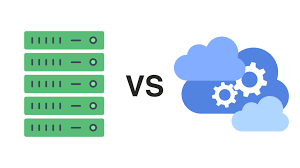Self-Hosting vs. Cloud Hosting: Which Option is Right for You?
When it comes to hosting your website or applications, you have two primary options: self-hosting or cloud hosting. Each approach has its own advantages and considerations.

Introduction
When it comes to hosting your website or applications, you have two primary options: self-hosting or cloud hosting. Each approach has its own advantages and considerations. In this article, we will explore the differences between self-hosting and cloud hosting and help you determine which option is the right fit for your needs.
Self-Hosting
Self-hosting involves hosting your website or applications on your own infrastructure. This means you are responsible for procuring and maintaining the hardware, setting up the server environment and managing all aspects of the hosting process. Here are some key factors to consider when evaluating self-hosting:
Control and Customisation
Self-hosting provides you with complete control over your server environment. You have the freedom to choose the hardware, operating system and software stack that best aligns with your requirements. This level of control enables you to customise and configure your hosting environment to suit your specific needs, giving you maximum flexibility.
Data Ownership and Privacy
With self-hosting, you retain full ownership and control over your data. You are not subject to the terms and conditions or data usage policies of third-party hosting providers. This provides greater privacy and security for your data, reducing the risk of unauthorised access or data breaches.
Cost Considerations
Self-hosting usually requires an initial investment in hardware, software licenses and network infrastructure. While this can be a barrier for individuals or small businesses with limited budgets, self-hosting can lead to cost savings in the long run. By eliminating recurring subscription fees associated with cloud hosting, you have more control over your expenses and can choose cost-effective hardware and scaling options.
Technical Expertise and Maintenance
Self-hosting requires a certain level of technical expertise and ongoing maintenance. You need to have knowledge of server administration, networking, security practices and troubleshooting techniques. Regular maintenance tasks, such as applying software updates, monitoring performance and addressing any issues that arise, fall under your responsibility.
Cloud Hosting
Cloud hosting, on the other hand, involves hosting your website or applications on virtual servers provided by a cloud service provider. Here are some key factors to consider when evaluating cloud hosting:
Scalability and Flexibility
Cloud hosting offers high scalability and flexibility. With cloud providers, you can easily scale your resources up or down based on demand. This allows you to handle traffic spikes without the need to invest in additional hardware. Cloud hosting also provides access to a wide range of services and technologies that can be quickly integrated into your applications.
Reliability and Uptime
Cloud hosting providers typically offer high availability and redundancy. They have robust infrastructure and data centers that are designed to minimise downtime. With their distributed architecture, they can ensure that your website or applications remain accessible even in the event of hardware failures or network disruptions.
Managed Services and Support
Cloud hosting providers often offer managed services and comprehensive support. This means they handle many of the technical aspects, such as server maintenance, security updates and backups, on your behalf. This can be particularly beneficial if you lack the necessary technical expertise or resources to manage your own infrastructure.
Pay-as-You-Go Pricing
Cloud hosting typically follows a pay-as-you-go pricing model. You only pay for the resources you use, allowing for cost optimisation and flexibility. This is especially advantageous for businesses with fluctuating resource demands or seasonal traffic variations.
Choosing the Right Option
To determine whether self-hosting or cloud hosting is the right option for you, consider the following:
Technical Expertise: Self-hosting requires a higher level of technical expertise and ongoing maintenance. If you have the necessary skills and resources, self-hosting can provide more control and customisation options. Otherwise, cloud hosting may be a better choice as it offers managed services and support.
Budget and Scalability: Consider your budget and the scalability requirements of your website or applications. Self-hosting involves upfront costs and may require additional investment for scaling. Cloud hosting offers scalability on-demand and a pay-as-you-go pricing model, making it more suitable for businesses with variable resource needs.
Data Ownership and Privacy: If data ownership and privacy are critical concerns, self-hosting provides greater control and security. However, cloud hosting providers often have robust security measures in place and comply with industry standards and regulations.
Reliability and Uptime: Cloud hosting providers typically offer higher reliability and uptime due to their redundant infrastructure. If uptime is a top priority and you require a highly available environment, cloud hosting may be the better choice.
Conclusion
Choosing between self-hosting and cloud hosting depends on your specific needs, technical expertise, budget and scalability requirements. Self-hosting provides control, customisation and data ownership, but requires more technical skills and ongoing maintenance. Cloud hosting offers scalability, reliability, managed services and pay-as-you-go pricing, but may have limitations on customisation and data control.
Evaluate your requirements and weigh the pros and cons of each option. Consider factors such as control, cost, technical expertise, scalability and data privacy. By carefully assessing these factors, you can make an informed decision and select the hosting option that best suits your needs and goals.



